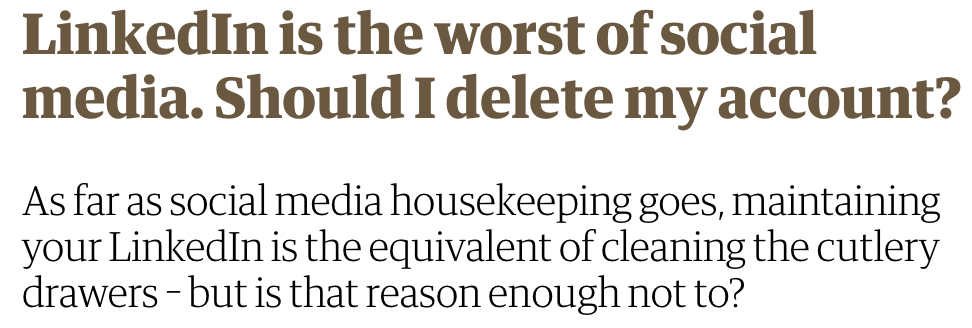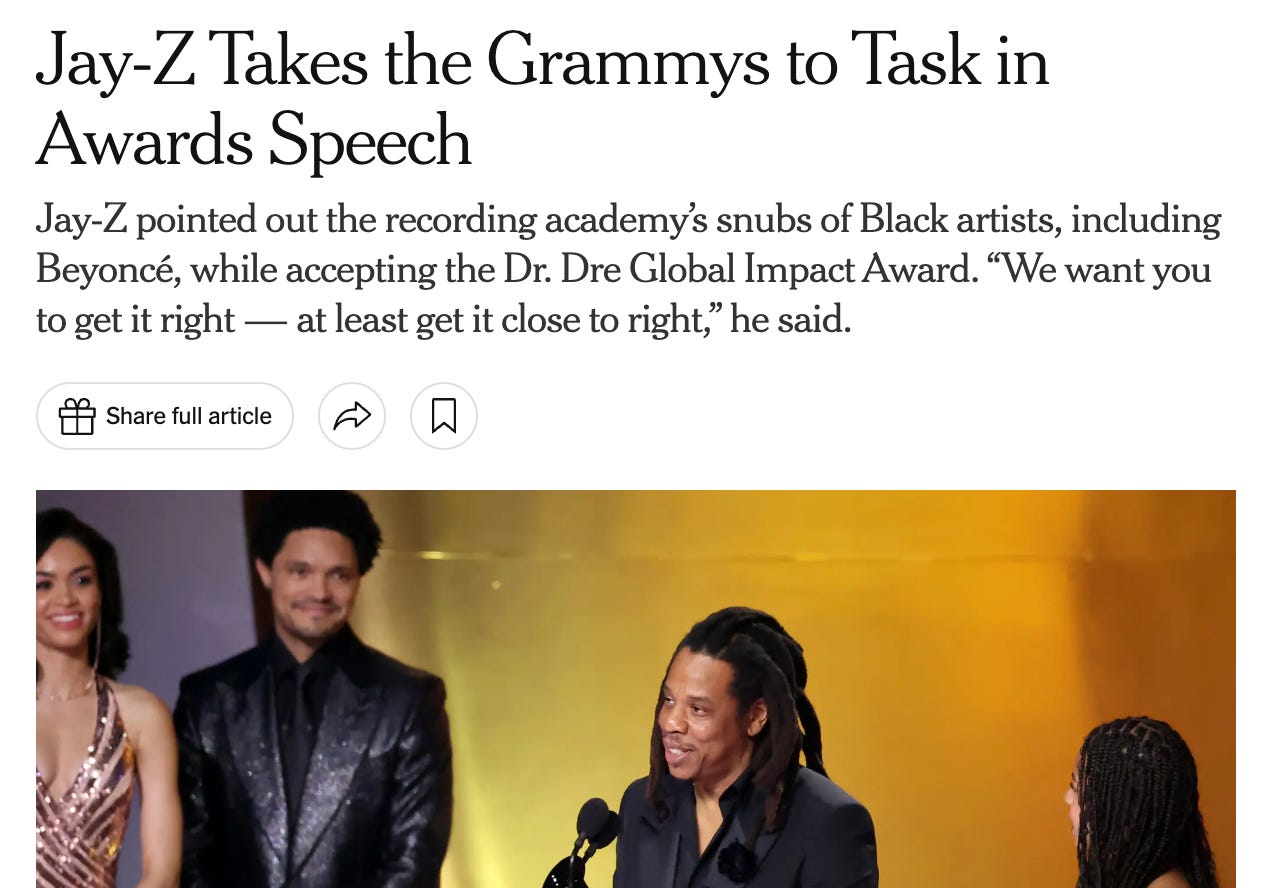One of the biggest concerns of the firms I advise isn’t about harsh external realities, but internal dynamics - the motivation of their people. It’s a complex topic and I write to make sense of things. This 3-part series explores the nature of work and ambition today - taking a global view of it to marry what’s happening in culture with what’s happening in our heads:
Part 3: Another Kind Of Happiness
Anyone who laments the effect TikTok/Instagram is having on young people’s mental health is hypocritical if they don’t also acknowledge how LinkedIn is wrecking the self-esteem of the white-collar workers residing in the Anglospheric internet.
In 2017, The Guardian ran this piece on the vapid nature of LinkedIn:

Surprise: No one deleted their account. The exact opposite happened - everyone you know is now on it. That was 7 years ago. LinkedIn had around 500M users. It surpassed 1 BILLION users a few months ago. On other platforms, self-promotion is mostly a byproduct but on here, it’s the whole point. But which self is it? With the decay of Twitter, LinkedIn has found itself as the binding agent of the blurring of work and private life I mentioned in part 1.
Career Dysmorphia
Humans are hard-wired for comparison.It’s starts with our siblings then our classmates then our co-workers. But LinkedIn has made that pool of comparison bigger - way bigger.
Comparisons can be good. It gives us a yardstick to measure ourselves, role models to aspire to and saves us from toiling through self-discovery from scratch. It helps us give shape to our ambition. The old markers of what it means to be a functional adult in the world - graduate at 22, married at 25, buy a house at 28, baby at 30 - don’t hold anymore. So where do we find our benchmarks? It’s bad enough that we use the two common comparison points in careers - how old someone is and which institution they studied at - to constantly judge ourselves - now I have these broadcasted into my phone daily from a lot more people than ever before!
What happens when our comparison engine goes on overdrive? Especially when the economy (and our jobs) feel precarious? Some researches set out to find out exactly that. The main conclusion of their study was that using sites like LinkedIn and Xing (LinkedIn, but make it Chinese) can lead to imposter thoughts and that, in turn, triggered anxiety and stress. It isn’t enough to do your job, advocate for yourself in your workplace, build ‘executive presence’, now you need to do this outside working hours too - build that ‘personal brand’ - because everyone else you know is. This quote from a Trinity College student in Dublin sums it up
“Many who decided to do internships are rushing themselves on to the [career] ladder because they feel they’re behind, when in reality, everyone is behind”
No matter what you do, someone else (someone you may not even know) is doing it better. This career dysmorphia is only getting worse.
I can’t thank you enough for your attention. Subscribe for free to receive new posts and support our work.
Beyonce, one of us!
In a productivity focused world we associate wants with goals. I turn to Luke Burgis’s book Wanting for some guidance on the difference:
The obsession with goal setting is misguided, even counterproductive. Setting goals isn't bad. But when the focus is on how to set goals rather than how to choose them in the first place, goals can easily turn into instruments of self-flagellation.
Most people aren't fully responsible for choosing their own goals. People pursue the goals that are on offer to them in their system of desire. Goals are often chosen for us, by models. And that means the goalposts are always moving.
This system that drives our wants is called Mimetic Desire - where we want things based on what we imitate and who we imitate. This can often lead to a dissonance between what truly matters and what you think should matter to you.
Take Beyonce for instance. She’s a once-in-a-generation multi-hyphenate star of epic proportions. She’s met every conceivable goal she could possibly have in the music industry. She’s clearly someone who knows and sings her mind. YET, we have Jay-Z getting on stage at the Grammy’s talking about how she still hasn’t been awarded Album Of The Year. Beyonce is a galactic star. Then why bother with a tiny-metiorite-of-an-award? Is the award a goal, or a want? I mean if Beyonce can’t find the answer, what hope do we mere mortals have?

Off-the-shelf
Two years ago, a new (senior) role opened up at work - which would have been a short-cut to the next level on the corporate ladder. A lot of well-meaning mentors told me this was my chance.
“You’re ready, but you need to show it.”
“Throw your hat in the ring”
“Why don’t you want that role? Everybody who has your tenure should be chasing it with everything they got.”
“If you want to get promoted you better show up asking for it. If you want to get promoted you better send this specific signal.”
Dear reader, let me tell you zero hats were thrown by yours truly.
For as long as corporations have existed, promotions have played a great role in motivating employees - and paying them their dues in terms of raises and title bumps. But they can also be a mimetic desire trap. Promotions, for many companies, became the single biggest bundle of material motivation packing in title, salary and bonus bumps. It’s simpler to implement. I mentioned in Part 1 how one big reason fro employee exhaustion is the disconnect between what they do all day and a tangible outcome for the company - purpose. So if you don’t have purpose, might as well work for the promo. Right?
In a booming economy this wasn’t an issue. The corporate ladder kept going up and every rung aimed for the one above it - never-ending motivation! But it was also in their interest for companies to downplay it. We’ve all heard HR platitudes and endless panels about ‘oh promotions are just one aspect of career growth’. You’ve seen the ‘career is a jungle gym and not a ladder’ quote by Sheryl Sandberg. Sure! Easy for someone to say that when they’re already the COO of Meta. Why would we insist that promotions don’t matter, when only those who are promoted get more scope of work, more salary and more bonus?
The belt tightening of the last two years has done away with this farce. You can promote 10% of your company if your profits have been growing at 20%. When the latter stops, the former grinds to a halt too. This is simple logic, but made promotions so coveted that our brains don’t know what else to work for when they swipe that badge every morning. Yet, slacking isn’t an option. This is the time the company needs you. You should be so thankful to have a job that you should be doing more of it. It’s rude to ask, or even think, of a promotion. But why chastise employees for merely coveting what they were trained to covet all these years? When there is more uncertainty, you probably need to shield your mental health, find ways to be with friends and family more - but we now feel like we can’t afford to.
Promotions are commodified ambition.“Here are some off-the-shelf dreams for you to aim for so you don’t have to spend too much time thinking about what you actually want.” Commodities are important for everyday life, but in this case they can corrupt personal motivation, making it driven by external factors rather than internal ones.
For me, there were two reasons to not go for that supposedly “career-making” role:
- I found the role profoundly dull - no new problems to fix, not enough agency to bring about meaningful change. I’m the happiest person I know. And what makes me happy is novelty - of problems, of projects. I did not foresee happiness.
- Throughout my working life, chasing curiosity has always been a lot more satisfying than climbing ladders. The ladder climbing happened, on the side. Of course it felt great after it did happen! But every time it was at the brink of happening, I’d be miserable. Because the siren song was too strong to resist. Because we have been conditioned to want it so bad, yet so much is out of your control with built-in scarcity - and when it would be just within range, the job I loved just a few months ago would feel like a burden.
Post-ambition
Like all commodities, corporate ambition comes in only a few SKUs. Ask yourself: describe the kind of person who gets promoted at your company without mentioning their actual work. Chances are you have an archetype. And the fact that you do, means that there is already bias in the system.
McKinsey’s Women In Workplace study has shown something called the ‘Great Breakup’ two years in a row. Women at the director level, the group next in line for senior-leadership positions, are leaving companies at a higher rate than in past years—and at a notably higher rate than men at the same level. It’s a giant “i’ve had enough of this” table flip and door slammed. Because you, the individual whom the system is biased against, are expected to work even harder than ever before to prove that you’re worthy - and that is never not exhausting. In the upper floors of the house of corporate ambitions, there is very little room for women.
“If climbing the career ladder comes at the expense of a healthy work-life balance, many women figure leadership is not worth it. They remain ambitious, but they can’t or won’t submit to the grind.”
- McKinsey’s Women In Workplace study
We are trying to untangle not just the work and leisure parts of our lives that have been smushed together but also the parts for rest and caregiving.
An increasing number of young Japanese workers are choosing non-full-time positions, valuing flexibility that lets them pursue their true interest.
A recent study by Aviva insurance found that 69% of UK workers would give up a promotion for a better work-life balance.
In China, pressures of social interactions, work and the combination of the two is prompting people to master the art of slacking to survive. Chinese internet is rife with hunong-ology (糊弄学 hùnòngxué) - the underlying philosophy is that “where there is a will to muddle through, there is a way - to do something half-heartedly while pretending to be earnest.
Embracing the art of hunong supposedly empowers individuals to navigate our exhausting world with essential energy-saving tricks, striking a delicate balance between meaningful engagement and the need for personal space.
We’re increasingly asking ‘how much is enough?’
I grew up living in a 2 bedroom home with 13 others, in a small town with no accessible libraries, in a poor state in Eastern India. It was by no means a life of poverty but it was that of intellectual claustrophobia. Just the mere act of moving out, leaving town, and the state was the ceiling of 18-yr old Gautam. I did it! Moved out for college - and when I landed a plum job as a Deloitte engineering consultant, I didn’t bat an eyelid when quitting that coveted job within the first three months to go join an ad agency that would pay me two-thirds of what I was getting paid as a software engineer. Because I knew I had crossed that ceiling - no matter what I did next, there would be no going back under that ceiling again. I was post-ambition.
I think of these as levees that tell us when what we have is enough, and for how long. That signal when we’re full, before we feel heavy. It changes with how we change. But it’s ours - we might still want things in the construct of mimetic desires others influence us to have - but at least when we own our ambition, we get to set our own limits.
Maybe organic, home-grown, small-batch, hand-made ambition is where it's at. In Part 3, I trace movements around the globe that are finding a new answers to questions we’ve posed till now.
I can’t believe you stuck with me so far!
I love writing these - it helps me make connections, find new articulations for what is a messy jumble of thoughts in my head. I’m very grateful you chose to spend some of your attention with it.
Would you do me a solid and pick a quote or a paragraph and share it with your network(s)? It’ll be funny seeing quotes about how bad LinkedIn is for our mental state on LinkedIn! 😂
If you share this you’ll be my best friend. Pinky promise!


